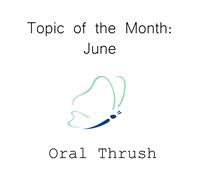Oral thrush (oral candidiasis) is a yeast infection of the mouth caused by a type of fungus called Candida albicans. The infection is not contagious. The symptoms often include:
• Sore, white or yellow patches in the mouth (called plaques) that can be wiped off.
• A painful, burning sensation on the tongue
• Cracks in the corner of the mouth
• Difficulty swallowing
• A bitter or salty taste in the mouth
Oral thrush can occur in people with a weakened (or suppressed) immune system. It is therefore a fairly common symptom for lupus patients, who often receive immunosuppressive treatments.
In addition to a suppressed immune system, you are also more at risk of developing oral thrush if you:
• Have diabetes
• Have high blood sugar levels
• Wear dentures that are poorly fitted or not cleaned regularly
• Often take anti-biotics
• Have an iron or B-vitamin deficiency
• Are having chemotherapy or radiotherapy
• Are a smoker
You should seek medical advice from your GP if you have any of the symptoms of oral thrush. If it is left untreated then it can cause soreness and discomfort in the mouth. In most cases a GP will be able to diagnose oral thrush simply by examining the white patches in your mouth. Sometimes a biopsy or blood test may be carried out to confirm diagnosis.
The condition can be successfully treated with anti-fungal medicines. These include:
• Fluconazole
• Itraconazole
• Nystatin
• Clotrimazole
• Econazole
• Ketonconazole
*Some antifungal medications should not be used if you are preganant, breastfeeding or taking other medications. Always seek advice from your GP, consultant or pharmacist before taking any antifungal medicines*
If you are on a treatment that is thought to be causing the oral thrush, such as certain antibiotics or corticosteroids then your treatment may be changed or the dosage reduced.
You can reduce your chances of developing oral thrush by keeping your mouth clean and healthy. This can be achieved by:
• Rinsing your mouth after meals
• Visiting your dentist for regular check-ups
• Eating a healthy and balanced diet that doesn’t exceed the recommended amount of sugar
• Flossing regularly
• Using mouthwashes as part of your routine
• Brushing your teeth twice a day with toothpaste that contains fluoride
We asked you to provide your top tips and experiences. Many people suggested pro-biotics and natural yoghurt:
- “Pro-biotics, although they are an immune booster. I only use them when I take anti-biotics, otherwise I get oral yucky thrush”
- “When It’s mild-moderate, I try to eat natural yoghurt, which helps a little”
- “Natural yoghurt sometimes works”
- “Eat live natural unsweetened yoghurt”
You also told us about some of your experiences using certain products:
- “Corsodyl mouthwash”
- “I use Listerine mouthwash and Corsodyl gel”
- “Biotene mouthwash and toothpaste. My oral consultant gave me this advice and I could not do without it”
- “…Biotene is great because it has no soap in it – so no irritants”
- “I used Daktarin oral gel…that seemed to help a lot”
- “Trouble with Corsodyl is it can stain your teeth brown”
- “and with a sore mouth [Corsodyl] can sting so much!”
A few of you have tried some anti-fungal medications:
- “Fluconazole works for me”
- “Nystatin is brilliant, but is only available on prescription”
- “My GP prescribed an excellent suspension. When I used it, it cleared up in no time”
- “I also have used Nystatin suspension for oral thrush. Miconazole gel can help for some types of thrush, or if it becomes a chronic problem”
Other suggestions we received from you were:
- “I find fresh pineapple is great”
- “Hold the anti-fungal solution in your mouth as long as possible (at least a minute), swallow it (the thrush will be in the throat as well as the mouth). Try not to drink or eat for ½ hour to allow time to work”
- “Brush dentures thoroughly and use Steradent overnight”
- “I eat a spoon of marmite in the mornings to up my B12. Ask a doctor to check for anaemia and take iron supplements if necessary.”
- “My Dentist gave me a special brush and some toothpaste that I brush on my teeth and mouth at night after I have cleaned my teeth and that seems to help – Flouri-guard Gel-Cam”
***Please note that this article is written for informational purposes only and should not be a substitute for professional medical advice or treatment. Do not delay seeking or disregard medical advice based on information here. Always seek the advice of your local family physician or other qualified health professional before starting any new treatment or making any changes to existing treatment. It is also adviseable to consult a medical professional before making any changes to diet or starting alternative remedies, which may interact with other medications.***
Thank you so much to everybody that submitted their tips and experiences for the article this month. We apologise if we were unable to use your submission.
If you try any of these tips or products, please let us know how you get on. Did you find it helpful? Is there something else that you’ve tried which we haven’t included? Let us know.
